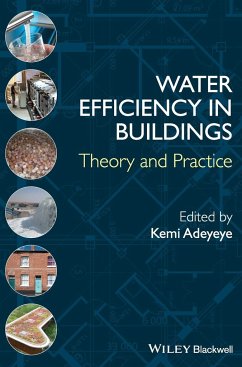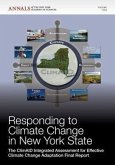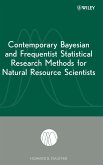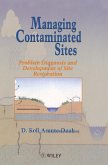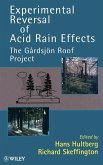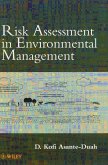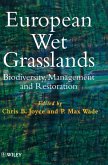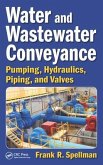Water Efficiency in Buildings
Herausgeber: Adeyeye, Kemi
Water Efficiency in Buildings
Herausgeber: Adeyeye, Kemi
- Gebundenes Buch
- Merkliste
- Auf die Merkliste
- Bewerten Bewerten
- Teilen
- Produkt teilen
- Produkterinnerung
- Produkterinnerung
This reference source on water efficiency in buildings provides comprehensive and up-to-date information. Both multi-disciplinary and practical, it signposts current knowledge, innovation, expertise and evidence on an important subject which is high in the resource management debate. Water Efficiency in Buildings: a review of theory and practice is structured into five sections: Policy; People; Building Design and Planning; Alternative Water Technologies; and Practical Examples & Case Studies. This final section of the book presents new and current practice as well as lessons learnt from case…mehr
Andere Kunden interessierten sich auch für
![Responding to Climate Change in New York State Responding to Climate Change in New York State]() Responding to Climate Change in New York State157,99 €
Responding to Climate Change in New York State157,99 €![Contemporary Bayesian and Frequentist Statistical Research Methods for Natural Resource Scientists Contemporary Bayesian and Frequentist Statistical Research Methods for Natural Resource Scientists]() Howard B. StaufferContemporary Bayesian and Frequentist Statistical Research Methods for Natural Resource Scientists175,99 €
Howard B. StaufferContemporary Bayesian and Frequentist Statistical Research Methods for Natural Resource Scientists175,99 €![Managing Contaminated Sites Managing Contaminated Sites]() D Kofi Asante-DuahManaging Contaminated Sites358,99 €
D Kofi Asante-DuahManaging Contaminated Sites358,99 €![Experimental Reversal of Acid Rain Effects Experimental Reversal of Acid Rain Effects]() Experimental Reversal of Acid Rain Effects345,99 €
Experimental Reversal of Acid Rain Effects345,99 €![Risk Assessment in Environmental Management Risk Assessment in Environmental Management]() D Kofi Asante-DuahRisk Assessment in Environmental Management376,99 €
D Kofi Asante-DuahRisk Assessment in Environmental Management376,99 €![European Wet Grasslands European Wet Grasslands]() European Wet Grasslands294,99 €
European Wet Grasslands294,99 €![Water and Wastewater Conveyance Water and Wastewater Conveyance]() Frank R SpellmanWater and Wastewater Conveyance252,99 €
Frank R SpellmanWater and Wastewater Conveyance252,99 €-
-
-
This reference source on water efficiency in buildings provides comprehensive and up-to-date information. Both multi-disciplinary and practical, it signposts current knowledge, innovation, expertise and evidence on an important subject which is high in the resource management debate. Water Efficiency in Buildings: a review of theory and practice is structured into five sections: Policy; People; Building Design and Planning; Alternative Water Technologies; and Practical Examples & Case Studies. This final section of the book presents new and current practice as well as lessons learnt from case examples on the use of water saving technologies and user engagement. Current evidence is vital for effective policy making. The dynamic nature of issues around water resource management creates a higher need for robust and reliable data and research information that can inform policy and regulations. This compendium provides a roadmap for researchers and building professionals on water efficiency as well as for policy makers and regulators. The case studies and research presented fall within the water supply and demand spectrum, especially those that focus on process efficiency, resource management, building performance, customer experiences and user participation, sustainable practises, scientific and technological innovation. The benefit and impact of the research is at the localand national level, as well as in the global context.
Hinweis: Dieser Artikel kann nur an eine deutsche Lieferadresse ausgeliefert werden.
Hinweis: Dieser Artikel kann nur an eine deutsche Lieferadresse ausgeliefert werden.
Produktdetails
- Produktdetails
- Verlag: Wiley
- Seitenzahl: 336
- Erscheinungstermin: 3. März 2014
- Englisch
- Abmessung: 250mm x 175mm x 22mm
- Gewicht: 752g
- ISBN-13: 9781118456576
- ISBN-10: 1118456572
- Artikelnr.: 40720317
- Herstellerkennzeichnung
- Libri GmbH
- Europaallee 1
- 36244 Bad Hersfeld
- gpsr@libri.de
- Verlag: Wiley
- Seitenzahl: 336
- Erscheinungstermin: 3. März 2014
- Englisch
- Abmessung: 250mm x 175mm x 22mm
- Gewicht: 752g
- ISBN-13: 9781118456576
- ISBN-10: 1118456572
- Artikelnr.: 40720317
- Herstellerkennzeichnung
- Libri GmbH
- Europaallee 1
- 36244 Bad Hersfeld
- gpsr@libri.de
The Editor Kemi Adeyeye is Senior Lecturer in Architecture Technology at the University of Brighton; she is also Principal Investigator and Coordinator of the Water Efficiency in Buildings Network Chapter authors provide a balance of academic and practitioner views, from leading design and engineering practice to systems developed with manufacturing companies.
About the Editor x
About the Contributors xi
Foreword by Jacob Tompkins, Managing Director of Waterwise xxi
Preface xxiii
Acknowledgements xxvii
Abbreviations xxviii
Section 1 Policy 1
1 Water Policy and Regulations: A UK Perspective 5
Kemi Adeyeye
Introduction 5
Water policy and context 6
Policy for water users 9
Methodology 11
Interview findings 11
Discussion 19
Further recommendations 21
Conclusion 21
Acknowledgements 22
References 22
2 Water Policy in Water-Stressed Regions: The Case Study of Iran 24
Eric R.P. Farr and Poorang Piroozfar
Introduction 24
Iran: water resources and use 25
Water resource planning and implementation 27
Policy opportunities and constraints 31
Recommendations 33
Conclusion 39
Acknowledgements 40
Further reading 40
References 40
3 Water Policy for Buildings: A Portuguese Perspective 42
Armando Silva Afonso and Carla Pimentel Rodrigues
Introduction 42
Policy context and evolution 43
Water efficiency in buildings 46
Opportunities and constraints 50
Conclusions and recommendations 54
Further reading 55
References 55
Section 2 People 57
4 Understanding Consumer Response to Water Efficiency Strategies 61
James Jenkins and Alexis Pericli
Introduction 61
Explorations in socio-demographic and contextual factors 62
Broadening the understanding of consumer responses 64
Recognising the attitude-behaviour gap 67
Conclusion and recommendations 68
Further reading 70
References 70
5 Distributed Demand and the Sociology of Water Efficiency 74
Alison Browne, Will Medd, Martin Pullinger and Ben Anderson
Introduction 74
Developing an idea of 'distributed demand' and a practice perspective on
water efficiency 75
Beyond behaviour and technology: a practice perspective on 'efficiency' 77
Conclusion 83
Acknowledgements 84
Further reading 84
References 84
6 Co-creating Water Efficiency with Water Customers 88
Kemi Adeyeye
Introduction 88
Information technology for co-creation 92
A co-creation toolkit for personalised value and knowledge for water
efficiency 95
Discussion 104
Conclusion 105
Further reading 106
References 106
Section 3 Building Design and Planning 109
7 Assessment Methodologies for Water Efficiency in Buildings 113
Dexter Robinson and Kemi Adeyeye
Introduction 113
Building environmental assessment and rating methods 114
Discussion 124
Conclusion 126
Further reading 127
References 127
8 Intelligent Metering for Urban Water Planning and Management 129
Cara Beal, Rodney Stewart, Damien Giurco and Kriengsak Panuwatwanich
Introduction 129
Role of intelligent water metering and big data 131
Intelligent metering applications and benefits 135
Conclusion and recommendations 143
Further reading 145
References 145
9 Integrated Sustainable Urban Drainage Systems 147
Stephen J. Coupe, Amal S. Faraj, Ernest O. Nnadi and Susanne M.
Charlesworth
Introduction 147
Sustainable drainage systems 148
Types of SuDs 151
Case studies: integrated SuDs 156
Conclusion 160
Further reading 161
References 161
Section 4 Alternative Water Technologies 165
10 Greywater Recycling in Buildings 169
Erwin Nolde, Nolde and Partner
Introduction 169
Greywater quantity and quality 170
Greywater policy and guidelines 172
Greywater technology 173
Project examples 179
Benefits and constraints of greywater recycling 183
Conclusion and recommendations 187
Further reading 188
References 188
11 Rainwater Recycling in Buildings 190
Siraj Tahir, Ilan Adler and Luiza Campos
Introduction 190
Rainwater harvesting systems 191
Rainwater quality 192
Treatment technologies 194
Storage system sizing 199
Environmental benefits 203
User perception and acceptability 203
Conclusions 205
Further reading 206
References 206
12 A Strategic Framework for Rainwater Harvesting 209
Sarah Ward, Stewart Barr, Fayyaz Ali Memon and David Butler
Introduction 209
Developing a socio-technical evidence base 211
Selected socio-technical evidence base results 213
The strategic framework for RWH in the UK - a synthesis 219
The framework 223
Conclusion 225
Acknowledgements 225
Further reading 225
References 226
Section 5 Practical Examples and Case Studies 229
13 Lifecycle Benefits of Domestic Water-Efficient Fittings and Products 233
Vivian Tam and Andrew Brohier
Introduction 233
Methodology 234
Findings 235
Conclusion 239
Further reading 239
References 240
14 Water Efficiency in Office Buildings 241
Lee Bint, Robert Vale and Nigel Isaacs
Introduction 241
Methodology 242
Influences on water efficiency 243
Conclusions and recommendations 249
Acknowledgements 250
Further reading 250
References 251
15 Lessons from a New Water Treatment Plant in a Water-Stressed Region 252
Davood Nattaghi and Poorang Piroozfar
Introduction 252
Case study: Mashhad water treatment plant 253
Practical problems associated with the new WTP 255
Conclusion 261
Acknowledgements 262
Further reading 262
Reference 262
16 Water-Efficient Products and the Water Label 263
Yvonne Orgill, Terence Woolliscroft and David Brindley
Introduction 263
Water and energy are inextricably linked 264
The Water Label 268
The Water Calculator 271
Conclusion 272
Further reading 272
References 272
17 'Greening the Green' - Community Water in the Age of Localism 273
Nick Gant, Jean Balnave and Kemi Adeyeye
Introduction 273
The case study community 275
The water workshop 276
Workshop findings 277
Action from the workshop 279
Discussion 281
Conclusion 283
Acknowledgements 284
Further reading 284
References 284
Index 287
About the Contributors xi
Foreword by Jacob Tompkins, Managing Director of Waterwise xxi
Preface xxiii
Acknowledgements xxvii
Abbreviations xxviii
Section 1 Policy 1
1 Water Policy and Regulations: A UK Perspective 5
Kemi Adeyeye
Introduction 5
Water policy and context 6
Policy for water users 9
Methodology 11
Interview findings 11
Discussion 19
Further recommendations 21
Conclusion 21
Acknowledgements 22
References 22
2 Water Policy in Water-Stressed Regions: The Case Study of Iran 24
Eric R.P. Farr and Poorang Piroozfar
Introduction 24
Iran: water resources and use 25
Water resource planning and implementation 27
Policy opportunities and constraints 31
Recommendations 33
Conclusion 39
Acknowledgements 40
Further reading 40
References 40
3 Water Policy for Buildings: A Portuguese Perspective 42
Armando Silva Afonso and Carla Pimentel Rodrigues
Introduction 42
Policy context and evolution 43
Water efficiency in buildings 46
Opportunities and constraints 50
Conclusions and recommendations 54
Further reading 55
References 55
Section 2 People 57
4 Understanding Consumer Response to Water Efficiency Strategies 61
James Jenkins and Alexis Pericli
Introduction 61
Explorations in socio-demographic and contextual factors 62
Broadening the understanding of consumer responses 64
Recognising the attitude-behaviour gap 67
Conclusion and recommendations 68
Further reading 70
References 70
5 Distributed Demand and the Sociology of Water Efficiency 74
Alison Browne, Will Medd, Martin Pullinger and Ben Anderson
Introduction 74
Developing an idea of 'distributed demand' and a practice perspective on
water efficiency 75
Beyond behaviour and technology: a practice perspective on 'efficiency' 77
Conclusion 83
Acknowledgements 84
Further reading 84
References 84
6 Co-creating Water Efficiency with Water Customers 88
Kemi Adeyeye
Introduction 88
Information technology for co-creation 92
A co-creation toolkit for personalised value and knowledge for water
efficiency 95
Discussion 104
Conclusion 105
Further reading 106
References 106
Section 3 Building Design and Planning 109
7 Assessment Methodologies for Water Efficiency in Buildings 113
Dexter Robinson and Kemi Adeyeye
Introduction 113
Building environmental assessment and rating methods 114
Discussion 124
Conclusion 126
Further reading 127
References 127
8 Intelligent Metering for Urban Water Planning and Management 129
Cara Beal, Rodney Stewart, Damien Giurco and Kriengsak Panuwatwanich
Introduction 129
Role of intelligent water metering and big data 131
Intelligent metering applications and benefits 135
Conclusion and recommendations 143
Further reading 145
References 145
9 Integrated Sustainable Urban Drainage Systems 147
Stephen J. Coupe, Amal S. Faraj, Ernest O. Nnadi and Susanne M.
Charlesworth
Introduction 147
Sustainable drainage systems 148
Types of SuDs 151
Case studies: integrated SuDs 156
Conclusion 160
Further reading 161
References 161
Section 4 Alternative Water Technologies 165
10 Greywater Recycling in Buildings 169
Erwin Nolde, Nolde and Partner
Introduction 169
Greywater quantity and quality 170
Greywater policy and guidelines 172
Greywater technology 173
Project examples 179
Benefits and constraints of greywater recycling 183
Conclusion and recommendations 187
Further reading 188
References 188
11 Rainwater Recycling in Buildings 190
Siraj Tahir, Ilan Adler and Luiza Campos
Introduction 190
Rainwater harvesting systems 191
Rainwater quality 192
Treatment technologies 194
Storage system sizing 199
Environmental benefits 203
User perception and acceptability 203
Conclusions 205
Further reading 206
References 206
12 A Strategic Framework for Rainwater Harvesting 209
Sarah Ward, Stewart Barr, Fayyaz Ali Memon and David Butler
Introduction 209
Developing a socio-technical evidence base 211
Selected socio-technical evidence base results 213
The strategic framework for RWH in the UK - a synthesis 219
The framework 223
Conclusion 225
Acknowledgements 225
Further reading 225
References 226
Section 5 Practical Examples and Case Studies 229
13 Lifecycle Benefits of Domestic Water-Efficient Fittings and Products 233
Vivian Tam and Andrew Brohier
Introduction 233
Methodology 234
Findings 235
Conclusion 239
Further reading 239
References 240
14 Water Efficiency in Office Buildings 241
Lee Bint, Robert Vale and Nigel Isaacs
Introduction 241
Methodology 242
Influences on water efficiency 243
Conclusions and recommendations 249
Acknowledgements 250
Further reading 250
References 251
15 Lessons from a New Water Treatment Plant in a Water-Stressed Region 252
Davood Nattaghi and Poorang Piroozfar
Introduction 252
Case study: Mashhad water treatment plant 253
Practical problems associated with the new WTP 255
Conclusion 261
Acknowledgements 262
Further reading 262
Reference 262
16 Water-Efficient Products and the Water Label 263
Yvonne Orgill, Terence Woolliscroft and David Brindley
Introduction 263
Water and energy are inextricably linked 264
The Water Label 268
The Water Calculator 271
Conclusion 272
Further reading 272
References 272
17 'Greening the Green' - Community Water in the Age of Localism 273
Nick Gant, Jean Balnave and Kemi Adeyeye
Introduction 273
The case study community 275
The water workshop 276
Workshop findings 277
Action from the workshop 279
Discussion 281
Conclusion 283
Acknowledgements 284
Further reading 284
References 284
Index 287
About the Editor x
About the Contributors xi
Foreword by Jacob Tompkins, Managing Director of Waterwise xxi
Preface xxiii
Acknowledgements xxvii
Abbreviations xxviii
Section 1 Policy 1
1 Water Policy and Regulations: A UK Perspective 5
Kemi Adeyeye
Introduction 5
Water policy and context 6
Policy for water users 9
Methodology 11
Interview findings 11
Discussion 19
Further recommendations 21
Conclusion 21
Acknowledgements 22
References 22
2 Water Policy in Water-Stressed Regions: The Case Study of Iran 24
Eric R.P. Farr and Poorang Piroozfar
Introduction 24
Iran: water resources and use 25
Water resource planning and implementation 27
Policy opportunities and constraints 31
Recommendations 33
Conclusion 39
Acknowledgements 40
Further reading 40
References 40
3 Water Policy for Buildings: A Portuguese Perspective 42
Armando Silva Afonso and Carla Pimentel Rodrigues
Introduction 42
Policy context and evolution 43
Water efficiency in buildings 46
Opportunities and constraints 50
Conclusions and recommendations 54
Further reading 55
References 55
Section 2 People 57
4 Understanding Consumer Response to Water Efficiency Strategies 61
James Jenkins and Alexis Pericli
Introduction 61
Explorations in socio-demographic and contextual factors 62
Broadening the understanding of consumer responses 64
Recognising the attitude-behaviour gap 67
Conclusion and recommendations 68
Further reading 70
References 70
5 Distributed Demand and the Sociology of Water Efficiency 74
Alison Browne, Will Medd, Martin Pullinger and Ben Anderson
Introduction 74
Developing an idea of 'distributed demand' and a practice perspective on
water efficiency 75
Beyond behaviour and technology: a practice perspective on 'efficiency' 77
Conclusion 83
Acknowledgements 84
Further reading 84
References 84
6 Co-creating Water Efficiency with Water Customers 88
Kemi Adeyeye
Introduction 88
Information technology for co-creation 92
A co-creation toolkit for personalised value and knowledge for water
efficiency 95
Discussion 104
Conclusion 105
Further reading 106
References 106
Section 3 Building Design and Planning 109
7 Assessment Methodologies for Water Efficiency in Buildings 113
Dexter Robinson and Kemi Adeyeye
Introduction 113
Building environmental assessment and rating methods 114
Discussion 124
Conclusion 126
Further reading 127
References 127
8 Intelligent Metering for Urban Water Planning and Management 129
Cara Beal, Rodney Stewart, Damien Giurco and Kriengsak Panuwatwanich
Introduction 129
Role of intelligent water metering and big data 131
Intelligent metering applications and benefits 135
Conclusion and recommendations 143
Further reading 145
References 145
9 Integrated Sustainable Urban Drainage Systems 147
Stephen J. Coupe, Amal S. Faraj, Ernest O. Nnadi and Susanne M.
Charlesworth
Introduction 147
Sustainable drainage systems 148
Types of SuDs 151
Case studies: integrated SuDs 156
Conclusion 160
Further reading 161
References 161
Section 4 Alternative Water Technologies 165
10 Greywater Recycling in Buildings 169
Erwin Nolde, Nolde and Partner
Introduction 169
Greywater quantity and quality 170
Greywater policy and guidelines 172
Greywater technology 173
Project examples 179
Benefits and constraints of greywater recycling 183
Conclusion and recommendations 187
Further reading 188
References 188
11 Rainwater Recycling in Buildings 190
Siraj Tahir, Ilan Adler and Luiza Campos
Introduction 190
Rainwater harvesting systems 191
Rainwater quality 192
Treatment technologies 194
Storage system sizing 199
Environmental benefits 203
User perception and acceptability 203
Conclusions 205
Further reading 206
References 206
12 A Strategic Framework for Rainwater Harvesting 209
Sarah Ward, Stewart Barr, Fayyaz Ali Memon and David Butler
Introduction 209
Developing a socio-technical evidence base 211
Selected socio-technical evidence base results 213
The strategic framework for RWH in the UK - a synthesis 219
The framework 223
Conclusion 225
Acknowledgements 225
Further reading 225
References 226
Section 5 Practical Examples and Case Studies 229
13 Lifecycle Benefits of Domestic Water-Efficient Fittings and Products 233
Vivian Tam and Andrew Brohier
Introduction 233
Methodology 234
Findings 235
Conclusion 239
Further reading 239
References 240
14 Water Efficiency in Office Buildings 241
Lee Bint, Robert Vale and Nigel Isaacs
Introduction 241
Methodology 242
Influences on water efficiency 243
Conclusions and recommendations 249
Acknowledgements 250
Further reading 250
References 251
15 Lessons from a New Water Treatment Plant in a Water-Stressed Region 252
Davood Nattaghi and Poorang Piroozfar
Introduction 252
Case study: Mashhad water treatment plant 253
Practical problems associated with the new WTP 255
Conclusion 261
Acknowledgements 262
Further reading 262
Reference 262
16 Water-Efficient Products and the Water Label 263
Yvonne Orgill, Terence Woolliscroft and David Brindley
Introduction 263
Water and energy are inextricably linked 264
The Water Label 268
The Water Calculator 271
Conclusion 272
Further reading 272
References 272
17 'Greening the Green' - Community Water in the Age of Localism 273
Nick Gant, Jean Balnave and Kemi Adeyeye
Introduction 273
The case study community 275
The water workshop 276
Workshop findings 277
Action from the workshop 279
Discussion 281
Conclusion 283
Acknowledgements 284
Further reading 284
References 284
Index 287
About the Contributors xi
Foreword by Jacob Tompkins, Managing Director of Waterwise xxi
Preface xxiii
Acknowledgements xxvii
Abbreviations xxviii
Section 1 Policy 1
1 Water Policy and Regulations: A UK Perspective 5
Kemi Adeyeye
Introduction 5
Water policy and context 6
Policy for water users 9
Methodology 11
Interview findings 11
Discussion 19
Further recommendations 21
Conclusion 21
Acknowledgements 22
References 22
2 Water Policy in Water-Stressed Regions: The Case Study of Iran 24
Eric R.P. Farr and Poorang Piroozfar
Introduction 24
Iran: water resources and use 25
Water resource planning and implementation 27
Policy opportunities and constraints 31
Recommendations 33
Conclusion 39
Acknowledgements 40
Further reading 40
References 40
3 Water Policy for Buildings: A Portuguese Perspective 42
Armando Silva Afonso and Carla Pimentel Rodrigues
Introduction 42
Policy context and evolution 43
Water efficiency in buildings 46
Opportunities and constraints 50
Conclusions and recommendations 54
Further reading 55
References 55
Section 2 People 57
4 Understanding Consumer Response to Water Efficiency Strategies 61
James Jenkins and Alexis Pericli
Introduction 61
Explorations in socio-demographic and contextual factors 62
Broadening the understanding of consumer responses 64
Recognising the attitude-behaviour gap 67
Conclusion and recommendations 68
Further reading 70
References 70
5 Distributed Demand and the Sociology of Water Efficiency 74
Alison Browne, Will Medd, Martin Pullinger and Ben Anderson
Introduction 74
Developing an idea of 'distributed demand' and a practice perspective on
water efficiency 75
Beyond behaviour and technology: a practice perspective on 'efficiency' 77
Conclusion 83
Acknowledgements 84
Further reading 84
References 84
6 Co-creating Water Efficiency with Water Customers 88
Kemi Adeyeye
Introduction 88
Information technology for co-creation 92
A co-creation toolkit for personalised value and knowledge for water
efficiency 95
Discussion 104
Conclusion 105
Further reading 106
References 106
Section 3 Building Design and Planning 109
7 Assessment Methodologies for Water Efficiency in Buildings 113
Dexter Robinson and Kemi Adeyeye
Introduction 113
Building environmental assessment and rating methods 114
Discussion 124
Conclusion 126
Further reading 127
References 127
8 Intelligent Metering for Urban Water Planning and Management 129
Cara Beal, Rodney Stewart, Damien Giurco and Kriengsak Panuwatwanich
Introduction 129
Role of intelligent water metering and big data 131
Intelligent metering applications and benefits 135
Conclusion and recommendations 143
Further reading 145
References 145
9 Integrated Sustainable Urban Drainage Systems 147
Stephen J. Coupe, Amal S. Faraj, Ernest O. Nnadi and Susanne M.
Charlesworth
Introduction 147
Sustainable drainage systems 148
Types of SuDs 151
Case studies: integrated SuDs 156
Conclusion 160
Further reading 161
References 161
Section 4 Alternative Water Technologies 165
10 Greywater Recycling in Buildings 169
Erwin Nolde, Nolde and Partner
Introduction 169
Greywater quantity and quality 170
Greywater policy and guidelines 172
Greywater technology 173
Project examples 179
Benefits and constraints of greywater recycling 183
Conclusion and recommendations 187
Further reading 188
References 188
11 Rainwater Recycling in Buildings 190
Siraj Tahir, Ilan Adler and Luiza Campos
Introduction 190
Rainwater harvesting systems 191
Rainwater quality 192
Treatment technologies 194
Storage system sizing 199
Environmental benefits 203
User perception and acceptability 203
Conclusions 205
Further reading 206
References 206
12 A Strategic Framework for Rainwater Harvesting 209
Sarah Ward, Stewart Barr, Fayyaz Ali Memon and David Butler
Introduction 209
Developing a socio-technical evidence base 211
Selected socio-technical evidence base results 213
The strategic framework for RWH in the UK - a synthesis 219
The framework 223
Conclusion 225
Acknowledgements 225
Further reading 225
References 226
Section 5 Practical Examples and Case Studies 229
13 Lifecycle Benefits of Domestic Water-Efficient Fittings and Products 233
Vivian Tam and Andrew Brohier
Introduction 233
Methodology 234
Findings 235
Conclusion 239
Further reading 239
References 240
14 Water Efficiency in Office Buildings 241
Lee Bint, Robert Vale and Nigel Isaacs
Introduction 241
Methodology 242
Influences on water efficiency 243
Conclusions and recommendations 249
Acknowledgements 250
Further reading 250
References 251
15 Lessons from a New Water Treatment Plant in a Water-Stressed Region 252
Davood Nattaghi and Poorang Piroozfar
Introduction 252
Case study: Mashhad water treatment plant 253
Practical problems associated with the new WTP 255
Conclusion 261
Acknowledgements 262
Further reading 262
Reference 262
16 Water-Efficient Products and the Water Label 263
Yvonne Orgill, Terence Woolliscroft and David Brindley
Introduction 263
Water and energy are inextricably linked 264
The Water Label 268
The Water Calculator 271
Conclusion 272
Further reading 272
References 272
17 'Greening the Green' - Community Water in the Age of Localism 273
Nick Gant, Jean Balnave and Kemi Adeyeye
Introduction 273
The case study community 275
The water workshop 276
Workshop findings 277
Action from the workshop 279
Discussion 281
Conclusion 283
Acknowledgements 284
Further reading 284
References 284
Index 287

